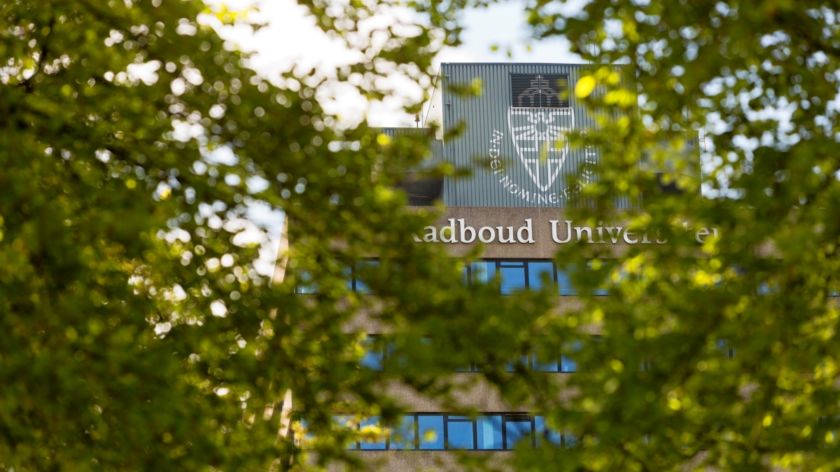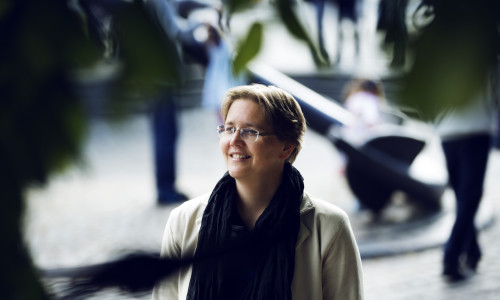Who’s afraid of internationalisation?
-
 © Dick van Aalst
© Dick van Aalst
Is the university focusing on the right things when it speaks about internationalisation? PhD student Rodrigo Bueno Lacy and assistant professor Olivier T. Kramsch attended the meeting on internationalisation last week. They say that for the most part, the discussion was based on a bizarre nationalist fantasy. 'There appears to be much apprehension by our university’s authorities, disguised as concern for students.'
On Thursday 5 October, a meeting on internationalisation was held in the Cultuurcafé, attended by all Radboud faculty deans, our university’s executive board and all staff and students with an interest in promoting internationalisation on our campus. At the start of the gathering, each faculty dean was given exactly six minutes to pitch their ‘vision’ of how our university might internationalise by the year 2025. Following their PowerPoint presentations, discussion amongst the audience members ensued, moderated by a spokesperson for the faculty board.
Aside from the content of the presentations and discussions, what appeared most striking to us was what was left unsaid rather than what was revealed about our university’s vision for internationalisation in the coming decade. Most saliently, an anxious frontier on the issue of internationalisation seemed to demarcate a division — a border if you will — as the discussion unfolded.
For the most part, the presentations and comments that followed focused — with what appeared to us as an unjustifiable fixation — on the promotion of English across Radboud’s study programmes and campus activities. As the discussion played out (led by a moderator who seemed oddly determined to dilute, deflect or infantilise the content of every substantive question), what we can only describe as a bizarre nationalist fantasy ensued.
The university can choose
In this fantasy, the Dutch students and academic staff find it distressingly difficult to speak English (even though the Dutch are well-known for their distinct command of the English language); the Faculty of Law sees little room for the proliferation of English-taught programmes (even though the Netherlands occupies an eminent place in the field of international law); and internationalisation, as something potentially ‘explosive’ if left unchecked, could risk making the Dutch language irrelevant (even though Dutch is a language known for punching far above its weight in the world of publications). There was talk of ‘being proud of Dutch culture’ and admonishment ‘not to endanger the use of Dutch at university’, as if either Dutch culture or its language were facing any threat of extinction. Where does this fear come from?
‘Isn’t the university the place where students should be confronted with things that are hard to learn?’
As a backdrop to justifying and legitimising these anxieties, it seems to us, lies a defence of functionality: Dutch students have little international ambitions, as most of them are mainly interested in the Dutch market and this fact limits whatever appetite for internationalisation the university may have. Three misperceptions support this assumption. The first is that students know what they should be taught, which amounts to the university relinquishing its scientific expertise to the misperceptions of the very people it is supposed to educate. The second is an error grounded in an understanding of basic economics: the market for Dutch students is not a homogeneous block and the university might become more attractive to students by capturing a niche of internationalisation. Indeed, by so doing Radboud might reshape and transform the market and profit from it on its own terms — a notion every student of economic geography is familiar with. The third is a misunderstanding of functionality. Everything that serves a function is functional; even highly dysfunctional systems are functional as long as their chaos becomes an acceptable function. However, the university is not subservient to dysfunctionality: it can choose.
There appears to be much apprehension by our university’s authorities, disguised as concern for students. They believe that students find it difficult to transition directly into an English-speaking classroom — a preoccupation that seemed to generate considerable support among the audience. Is this truly the case? Perhaps. But take a step back and reflect on the purpose of a university: isn’t this precisely the place where students should be confronted with things that are particularly hard to learn?
Narrow view
As a counterfactual thought experiment, consider the doomed fate of the Café Terecht: an empty campus space that got squatted not so long ago by some of the most academically talented and politically active students that Radboud should take pride in having produced over the past decade. During its brief existence, Café Terecht was a place that was international to its core in both its composition and aims. This could be felt from the ethnicities, attire and languages of its participants as well as by their activities (e.g. not only the learning of Dutch for refugees but also other languages). Terecht became a space that was entirely free, self-organised and largely oriented towards academic endeavours, supported by sympathetic teaching staff from across our faculties. Perhaps the not-so-forgotten spirit of Terecht could serve as a template for thinking about the kind of international atmosphere our campus may strive for in 2025?
‘A wealth of issues related to internationalisation remain to be discussed’
The experiences we touch on lead us to our larger concern. The presentations on internationalisation last Thursday focused almost exclusively on the promotion of English-taught programmes and the recruitment of international students as the main indices to measure the success of internationalisation. This narrow view of internationalisation assumes that attracting international students depends solely on offering English-taught courses. Such assumptions fly in the face of research demonstrating that international students choose desirable universities on the basis of the international visibility of its researchers and its overall academic reputational effects, usually grounded in fundamental, ground-breaking research (to take another standard concept from the lexicon of economic geography). We feel it would be productive in future internationalisation discussions to debate what kinds of high-quality, fundamental research might serve as long-term attractors of international student talent, rather than only focusing on statistical metrics (such as inbound/outbound numbers of students per faculty). If internationalisation metrics are to become just one more management criterion by which the ongoing competitive battle of the faculties is waged, we believe the spirit of internationalisation at our university will remain an elusive dream.
Enriching diversity
At the end of the presentations a man posed an interesting question. To paraphrase: ‘These internationalisation ambitions have existed on paper for the last twenty years, but the lack of investment has prevented them from becoming a reality. Are we willing to invest now?’ The moderator thanked him for his question and changed it into something banal. The authorities concluded that ‘we are doing well but, can do better’ and that in the end internationalisation was best left to the university’s heads because a more democratic procedure would be too ‘chaotic’.
Despite this underwhelming finale, we are heartened that our university’s administration has now organised a number of thematic meetings in which some of the pressing issues we raise in this intervention can be more fully developed, in a truly collective and hopefully democratic fashion. Among the urgent questions to be unpacked and debated: How, precisely, does international diversity enrich the classroom? How can the university learn from path-breaking experiments in the internationalisation of its classrooms, such as the one represented by its very own Asylum University initiative? This is a now 3-year-old experiment that seeks to integrate refugees at Radboud — started by geographers at the Nijmegen School of Management — and whose success has gone on to inspire similar examples of bottom-up internationalisation throughout the Netherlands and Europe. A wealth of issues related to internationalisation remain to be discussed, explored, debated, disagreed on and worked through. We are heartened to hear that our university’s governing board has taken the steps to launch campus-wide discussions on these issues over the coming weeks. We look forward joining the fray.




Wessel Meijer wrote on 19 oktober 2017 at 10:40
The authors refer to thematic meeting on internationalisation issues. We invite everyone who is interested or have concerns about the internationalisation of the university to join one or more of them. The first workshop is on “the International Classroom” and will take place on 24 October from 12:00 to 13:30 hours in The Global Lounge (in the book store). More information (on all workshops) and registration: http://www.radboudnet.nl/ri2025